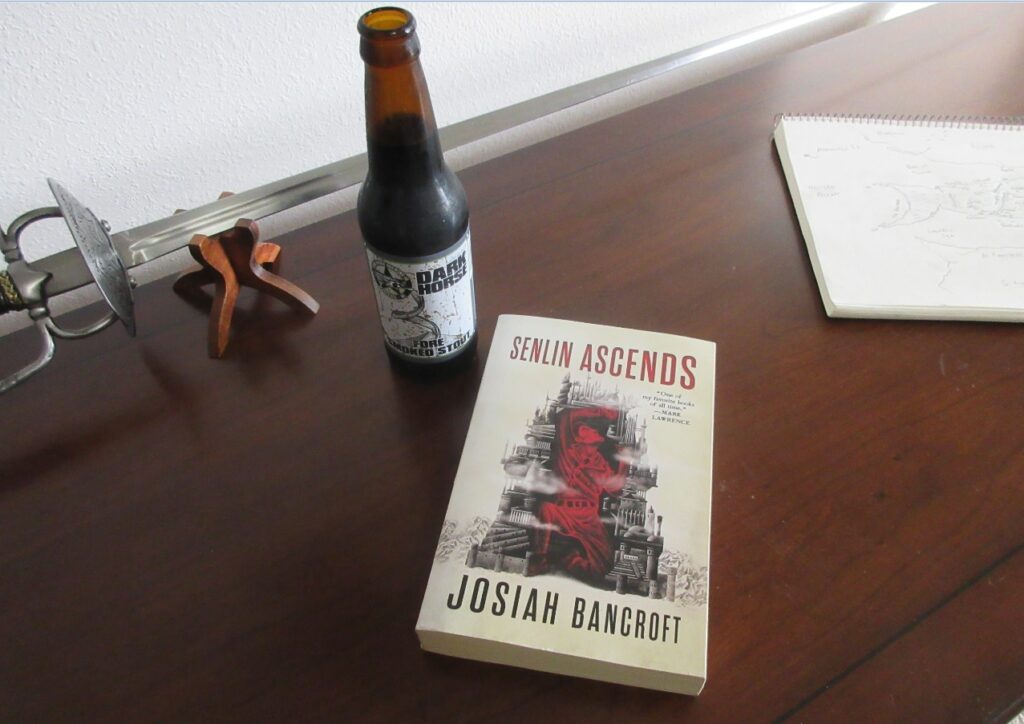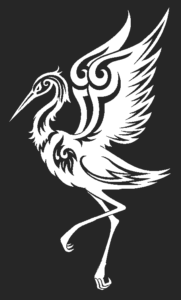Senlin Ascends by Josiah Bancroft

I put off writing my review of Josiah Bancroft’s Senlin Ascends, partly because no words would accurately describe how unique this book is. I suppose I will fall back on quantitative analysis: On day one I read to page 8. On day two I read to page 26. On day three I read to page 283, and only stopped because it was after midnight and I couldn’t keep my head up. On day four I finished. But I knew it was going to be a five star review by page 70.
Thomas Senlin is a kind but stuffy school headmaster whose world rests on a foundation of moral certainty and education. He and his plucky new bride Marya have traveled from their dull fishing village to the greatest wonder of the world for their honeymoon. The Tower of Babel is older than recorded history and no one knows how high it is. As soon as they get off the train, they become separated in a vast crowd, and he must find her. That’s literally the setup. It’s ridiculously simple, and I was hesitant to begin because of it. I was cosmically mistaken.
The story starts a bit slow, but this is a marathon rather than a sprint. Actually, it’s more like an ultra Ironman. In many fantasy stories there’s a map to keep you oriented, and in this case there’s a diagram of the lower levels of the tower, which I referred back to many times. One nice touch is that although it’s a simple line sketch, if you look closely you can see little elements from the story drawn onto each level.
The overall world has certain steampunkish elements, but I wouldn’t strictly call it a steampunk book. It has steam engines and airships and primitive electricity, but oddly enough no guns more advanced than flintlocks. This does limit the speed of the action scenes, which is a good thing. Senlin is a man who uses his mind more often than his fists, so thinking his way out of tight spots is more satisfying than shootouts. It’s a bit useless to talk about the worldbuilding, since each level, or “ringdom,” of the tower which Senlin must ascend in his search is different and strange in its own way. The world is thus rebuilt anew with each section. This is done mostly with the progressive shattering of Senlin’s preconceptions about the tower, or about the world in general, or about himself. His laughably useless guidebook to the tower is exactly opposite to the cruel and dangerous dictatorships, bureaucracies and gang wars that infest the immense structure, and he must shed his naive notions in order to survive and find his wife.
As Senlin ascends, he finds new clues about what’s happened to Marya, and figures out a way to follow. He is forced to make dark deals and hatch schemes of his own to further his goal, deciding who he’s willing to sacrifice. After a time Senlin begins to wonder whether finding Marya is truly as important as his own stubborn obsession with beating his enemies. The fact that he’s fully aware of this conflict takes nothing away from it. There is a constant theme of the reforging of the character into someone stronger but darker, where former virtues become flaws. It’s a classic trope, but it’s done expertly here.
I was reminded of the first couple volumes of Tad Williams’ science-fantasy epic Otherland, where the protagonists must negotiate one simulated world after another to get to the ultimate villains and rescue their kin. Because neither the reader nor the character knows what the next level of the tower will be like, the anticipation is reset every so often. The story is thus two-fold: the main plot and the revelation of what the tower really is. Its true dark nature becomes part of the story, and it in turn shapes Senlin’s character transformation. There is a gradual flipping of roles, where Senlin begins as someone fearful and completely at the mercy of the unscrupulous denizens of the tower, but eventually becomes willing to threaten violence to force others to give him what he wants. This transition is steady enough that it’s perfectly believable (certain HBO showrunners should take notes here). Conversely, he learns that although he can trust no one, he must in order to progress. The story contains many, many satisfying cases of setup and payoff, as well as some disturbing foreshadowing. There are many examples here where paying off expectations in surprising ways is far superior to “subverting expectations” simply for the sake of doing so.
By the end of this first book, Senlin has gained a few possible allies and many, many enemies, and has gotten himself embroiled in some as yet unexplained grander plot regarding even more powerful forces further up the tower. The ending is climactic, but perhaps a bit abrupt.
There are several flashback scenes, intercutting between his earlier, more innocent life and the tribulations he endures along the main timeline. This could be disorienting to some readers, but not to me. The pacing is not quick, but it is very good, because as soon as I begin to feel a little bit antsy for the plot to move forward, it does, almost as if Bancroft actually knows how to be a reader as well as a writer. This is not always a given.
This is a quintessential quest story, and quite possibly one of the finest books I’ve ever read. When I end up reading 150 pages beyond what I’d planned, I know I’ve stumbled on something special. I feel a bit spoiled, since the next two volumes of his Books of Babel epic are already out, and I don’t have to wait. I believe there is still a fourth to come. I’ve already ordered book two, Arm of the Sphinx, which I await with anticipation.
Josiah Bancroft’s website: TheBooksOfBabel.com
Pairs well with: Dark Horse Fore Smoked Stout
I was a big fan of Stone Brewing’s smoked porter way back when they still made it, and I haven’t found a good replacement. On the other hand, I’ve had one example of real-deal imported rauchbier, and I do not like that stuff at all. It’s like drinking smoked sausage, which might sound appealing to some but was not an experience I’d like to repeat. Dark Horse Brewing’s Fore Smoked Stout (7% ABV) is a baby step by comparison, though not a bad one. There’s almost no smoke on the nose, but lots of typical chocolatey malt. It’s a black as night pour with only a little head and light carbonation. There’s a bit more smoke in the flavor but nothing that will knock your socks off. It’s more like a burnt toast smoke, which is still pretty good. Chocolate, molasses, and coffee flavors dominate. There’s a bit of stickiness on the finish, which is why I tend to prefer porters when adding such thick flavors. Senlin’s ascent takes him through some parts of the tower that are both dark and smoky as well as deceptively sweet, so this stout goes nicely with it.
